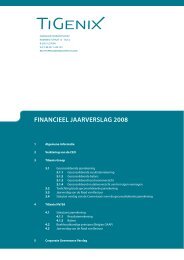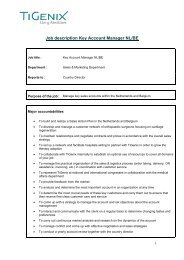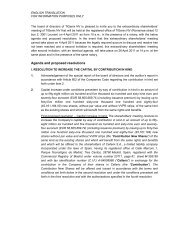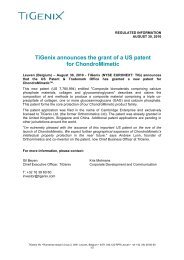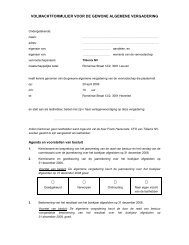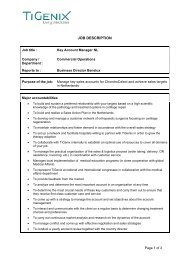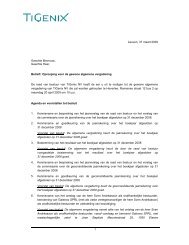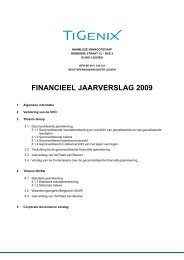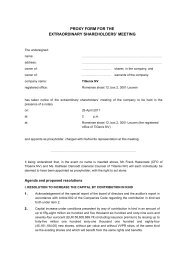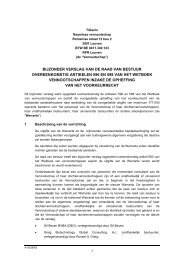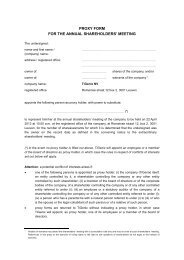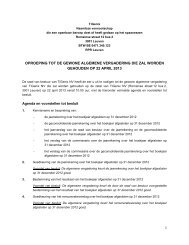ANNUAL REPORT 2012 - TiGenix
ANNUAL REPORT 2012 - TiGenix
ANNUAL REPORT 2012 - TiGenix
You also want an ePaper? Increase the reach of your titles
YUMPU automatically turns print PDFs into web optimized ePapers that Google loves.
Fig. 3 : Overview of estimated patient population suffering from complex perianal fistula<br />
Patient Pool for fistulas in Europe : 507.470.000<br />
(EU 27 + Norway, Switzerland, Lichtenstein and monaco)<br />
Patient Pool for fistulas in USA : 302.200.000<br />
0,1045 % 0,162 %<br />
Crohn’s disease<br />
Cases per year = 530.306<br />
Crohn’s disease<br />
Cases per year = 489.564<br />
12 % 12 %<br />
Perianal fistulas<br />
Cases per year = 63.317<br />
Perianal fistulas<br />
Cases per year = 58.748<br />
80 % 20 % 80 %<br />
20 %<br />
Complex fistulas<br />
# of cases = 50.910<br />
Simple fistulas<br />
# of cases = 12.727<br />
Complex fistulas<br />
# of cases = 46.998<br />
Simple fistulas<br />
# of cases = 11.750<br />
Taking into consideration a target population<br />
as described above and an estimated sales<br />
price range of KEUR 20 - 24, Cx601’s market<br />
size could be estimated to be around EUR<br />
1 billion for Europe and North-America<br />
combined.<br />
the biological drug Remicade ® (Infliximab).<br />
Both offer poor outcomes and in many<br />
instances notable side effects such as the<br />
reactivation of tuberculosis and increased<br />
risk of infection with Aspergillus, Listeria and<br />
Cryptococcus.<br />
For Crohn´s patients with complex perianal<br />
fistulas, currently, treatments of choice<br />
are antibiotics and azathioprine or<br />
6-mercaptopurine as first-line therapy, and<br />
The table below gives an overview of the<br />
most common treatments for perianal fistulas<br />
in Crohn’s disease patients with a brief<br />
description of their main characteristics :<br />
Antibiotics<br />
Immunosuppressants<br />
Antibiotics<br />
+ immunesuppressants<br />
Biologicals<br />
Use<br />
First line or<br />
adjuvant therapy<br />
to treat infections<br />
and abscess from<br />
fistula.<br />
Azatioprine and<br />
6-mercaptopurine<br />
used as first line<br />
after antibiotics<br />
therapy.<br />
Antibiotics and<br />
immunosuppresors<br />
often used in<br />
combination as first<br />
line therapy.<br />
Second line.<br />
Remicade ®<br />
(Infliximab) is the<br />
only approved<br />
biologic drug for<br />
fistulizing Crohn’s.<br />
Evaluation<br />
Seem to be useful<br />
if used short term<br />
or intermittently<br />
but adverse<br />
effects result from<br />
prolonged use.<br />
Very low efficacy in<br />
fistula closure but<br />
often reduction<br />
of inflammation,<br />
discharge and<br />
discomfort.<br />
Low efficacy and<br />
a high rate of<br />
relapse.<br />
Some efficacy<br />
in fistula closure.<br />
However,<br />
recurrence is<br />
almost assured<br />
when Infliximab is<br />
stopped. Serious<br />
side effects known.<br />
The burden of the perianal fistula in Crohn´s disease is high, both to the individual patient and<br />
to the health care provider. In financial terms the most significant portion of the cost burden of<br />
diagnosis and treatment can be attributed to the pharmaceutical treatment. A recent study<br />
conducted by IMS (independent provider of market research) on behalf of <strong>TiGenix</strong>, concluded<br />
66 <strong>TiGenix</strong> I annual report <strong>2012</strong>



